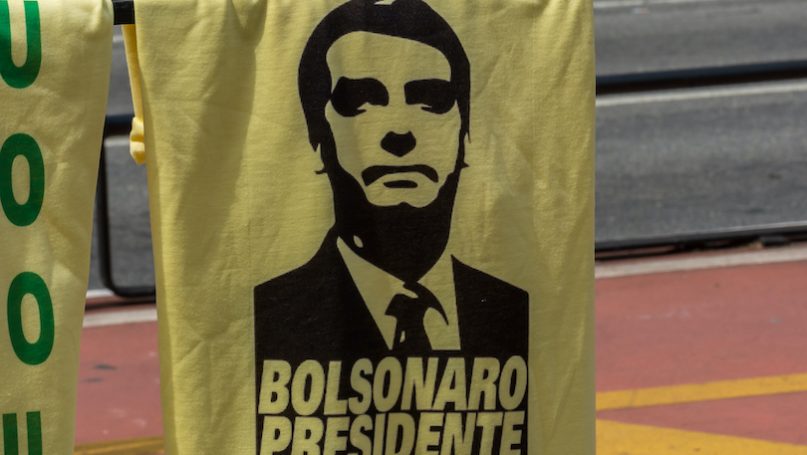
At first sight, Jair Bolsonaro’s foreign policy does not look very much Latin American: his government is pro-US, pro-Israel, indifferent to regional integration or south-south ties, and barely talks about development or poverty in international fora. In sharp contrast, there would be those ‘typical’ Latin American leaders, found across the political spectrum. People as different as Raúl Alfonsín, Ernesto Zedillo and Lula would all have incarnated in one way or another a quintessential Latin American foreign policy, constituted by: an emphasis on the need of more autonomy, especially in relation to the United States; the importance of Latin American integration or broader south-south ties; and the idea of foreign policy as a development instrument. These ideas would come from also typical political thinkers, especially those associated to the dependency theory, developmentalist thinking or peripheral autonomy ideas.
Yet, this is an illusion. The main pillars of Bolsonaro’s foreign policy have a long history in Latin America: alignment to the United States; demonization of the left and social democracy; and the need to protect the ‘true people’ from foreign forces. The often-bizarre rhetoric may be peculiar to his government, but the constituent parts of his foreign policy are not. At some point or another they were adopted by leaders such as Anastasio Somoza, Castello Branco, Augusto Pinochet, Hugo Banzer, Juan Carlos Onganía and Alberto Fujimori, some of whom Bolsonaro openly admires.
First, there is in Latin America a long history of alignment to the United States. As demonstrated by Andrés Malamud and Octavio Amorim Neto, a right-wing government is a predictor of alignment to the US in Argentina, Mexico and Brazil (although less strong in Brazil). Given a huge power asymmetry in the region, economic and political elites often look at the US as a potential source of protection, investment, legitimacy or guarantee of regime survival. Chile, for example, aligned itself to the United States during most of the Cold War. Argentine dictator Juan Carlos Onganía stressed the ‘Western and Christian’ character of his country, adopting a foreign policy that bears resemblance to Bolsonaro’s.
Pro-US attitudes tend to gain relevance once development models fail, making elites more likely to look back again at the US as a reference point. Embracing pro-US policies is a default mode to what elites sooner or later return once rents provided by the state under developmentalist models stop flowing. Indeed, Bolsonaro was elected after ‘local’ models led to economic recession, which severely diminished elites’ access to public resources. This created an environment in which pro-US policies were likely to flourish, facilitated by the ideological proximity between him and Donald Trump.
Second, his anti-communist and anti-liberal rhetoric is common among Latin American elites. During the cold war, virtually all military coups in the region aimed to prevent the emergence or maintenance of governments sympathetic to socialist or social democratic ideas. Juan Carlos Onganía, for example, rejected ties with socialist or non-aligned countries, defending the existence of ‘ideological frontiers’. Bolsonaro’s demonization of the Cuban and Venezuelan governments, as well as of everything even mildly related to left-wing or liberal ideologies is in this way very typical. These ideas come in part from anti-communist and anti-liberal ideologies common among Latin American militaries, including a focus on the hypothetical connections between ‘domestic enemies’ (social movements and the left, mainly) and foreign counterparts.
Finally, his government follows a long tradition of Latin American populism, in which a leader embodies the true people’s will in a fight against corrupt domestic and foreign forces. From Bolsonaro’s standpoint, environmental groups, pro-human rights activists and indigenous rights groups would be part of globalist forces, aiming at substituting ‘pure’ traditional values by foreign norms about sustainability, gender equality or reproductive rights. Conveying this message is very much facilitated by an ingenious use of social media, enabling him and his loyal entourage to mobilize followers in social media as no other politician in Brazil is currently able to do.
This does not imply, of course, that Bolsonaro’s foreign policy will produce outcomes similar to those of previous ones due to at least two reasons. First, the context is very different. Bolsonaro rules a country with a few strong institutions and in an international environment in which being anti-communist does not give you any special credentials (and may even harm Brazil’s interests in China). The anti-communist narrative of his loyal foreign minister, Ernesto Araújo, would have given him privileged access to global elites in a Cold War context, but in the current one makes him sound like a lunatic. He argued, for example, that the ‘new communism’ is using the Covid-19 pandemic to build a world without nations, liberty and soul.
Second, his foreign policy is supported by right-wing grassroots movements and various evangelical churches, which is a new phenomenon in Brazilian politics. They tend to reject left-wing ideologies and be sympathetic to the United States and Israel, thus reinforcing anti-communist, anti-liberal, pro-US and pro-Israel stances in Brazil’s foreign policy (for example, Bolsonaro was keen to move Brazil’s embassy to Jerusalem). Moreover, evangelical groups often believe that Bolsonaro was somehow sent by God, being ready to defend him no matter what. Although this type of cult personality is common in Latin American history, the combination of blind patriotism, evangelical Christianism and right-wing grassroots groups is new.
In summary, the ideas guiding Bolsonaro’s foreign policy are not essentially different from those championed by many others who preceded him. This factor, combined with a growing influence of evangelicals in politics and the ascension of grassroots right-wing movements imply that his ideas are likely to remain a political force in years to come, only expecting new incarnations to return.
Further Reading on E-International Relations
- Opinion – Bolsonaro’s Green and Yellow Guards
- Between Political Crisis and COVID-19: Bolsonaro’s Foreign Policy
- Bolsonaro’s Brazil in Times of COVID-19: A Necropolitical Pharmakon
- Brazilian Foreign Policy under President Bolsonaro: What Should We Expect?
- Analyzing Jair Bolsonaro’s COVID-19 War Metaphors
- The Dumb Giant: Brazilian Foreign Policy under Jair Bolsonaro